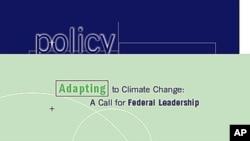The environmental and economic disasters caused by the continuing oil spill in the Gulf of Mexico may be fueling efforts in the U.S. Congress to finish work on a stalled energy and climate change bill.
Though the House of Representatives passed its version a year ago, the national debates over health care and the economy delayed action in the U.S. Senate. Heightened concerns about America's dependence on fossil fuels may be propelling renewed action on the energy and climate legislation.
American Power Act
Democrat John Kerry and independent Joe Lieberman introduced the American Power Act in the U.S. Senate. The bill's sponsors say that by putting a price on carbon released into the atmosphere, the measure would help reduce America's reliance on fossil fuels and cut its greenhouse gas emissions.
Debate is expected sometime in the coming months. A Republican-sponsored measure is also in the works.
In a speech at Carnegie Mellon University, President Obama referred to the Gulf oil spill in making the case that it is time, as he put it, to "aggressively accelerate the nation's transition to a clean energy economy. "
In crafting the U.S. response to global climate change, the president said congressional lawmakers must take into account the real price of America's heavy reliance on petroleum-based energy.
"If we refuse to take into account the full costs of our fossil fuel addiction - if we don't factor in the environmental costs and the national security costs and the true economic costs - we will have missed our best chance to seize a clean energy future."
High costs
A new report by the PEW Center on Global Climate Change, an independent policy research group, echoes the president's view. But it adds that, even if aggressive policies are put in place to reduce future carbon emissions, steps must be taken now to adapt to greenhouse gases already in the atmosphere; emissions that will continue to pollute the air and affect the earth's climate.
And who should lead that effort?
PEW Vice President for Policy Analysis and the report's co-author, Stephen Seidel, says the federal government should lead, as the nation's largest landowner and the guardian of its natural resources, national parks and highways, bridges and dams.
"What the federal government does, has a huge impact on where we build in coastal zones, how we farm, what our infrastructure looks like," says Seidel. "And so decisions that federal agencies are making will have an enormous impact in our ability to wisely adapt to climate change."
Thinking ahead
The report recommends that all federal agencies begin long-term strategic planning on climate impacts.
It also recommends a coordinated climate adaptation research program and a national climate service to better inform all levels of government, the private sector, and the general public, about what climate change will mean for them.
Seidel says, "The first question anyone, when they are told that they have to adapt to climate change, they are going to ask, 'What is that change I have to adapt to? How much sea level rise? How much temperature change? How much change in precipitation are we really talking about? Seidel says providing that information is a critical element to understanding climate change".
The report identifies models for adaptation strategies from other countries. Seidel says many cities - including New York - also already have aggressive adaptation plans in place.
"[New York] looked at things like where should they locate waste water treatment facilities because of the impacts of climate change, what risks are likely to occur to their subway system because it's underground and already requires enormous pumping of water during certain large rainfall events."
Seidel says adaption to climate change is no longer an option. It is a necessity.
He believes that the first priority of any climate bill enacted by Congress must be to put a cap on global warming gases. Unless carbon emissions are brought under control, he says, the challenge of adapting to global climate change will become ever more difficult.




